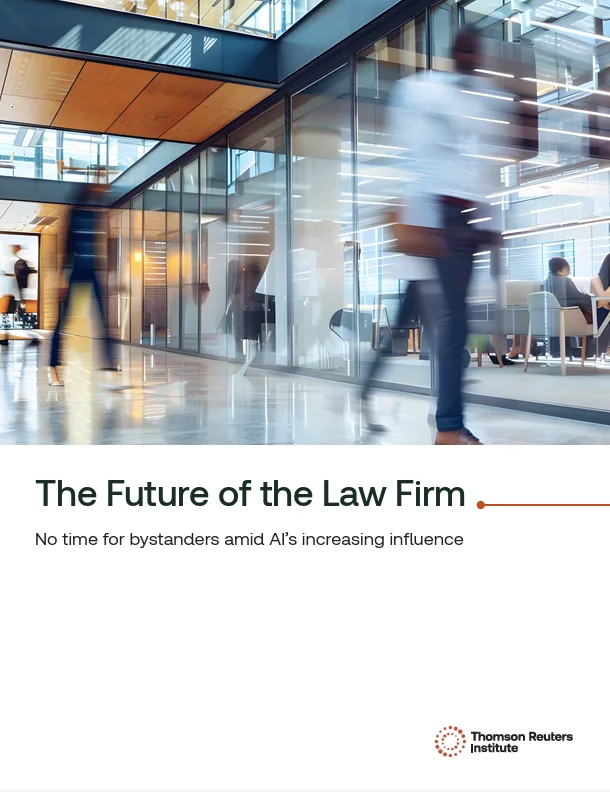Doesn’t it seem as though generative artificial intelligence (GenAI) is suddenly everywhere? Open a PDF, for instance, and you’ll see an “AI Assistant” button on the corner. Conduct an online search, and the search engine will be touting its AI capabilities.
And yes, GenAI is starting to make inroads into the legal profession. It’s true that the technology is fairly new, and many of its potential effects on legal practice remain unclear. But what is clear is that GenAI will transform the profession in numerous positive ways—for instance, streamlining many mundane processes, such as research and document review.
It’s also likely to have a profound effect on the law firm billing model. The Thomson Reuters Institute just released a report titled 2024 Generative AI in Professional Services. The legal professionals surveyed in the report are largely aware of GenAI. More than half of the law firm respondents believe that billing rates will stay the same or even increase. At the same time, 39% of respondents believe that the use of alternative fee arrangements (AFAs) is likely to increase as GenAI becomes more prevalent in legal practice. A slightly smaller group believe the use of the hourly billing model will remain the same or even increase.
It’s true that the use of GenAI is very new, and its potential effects on legal practice remain unclear. But what is clear is that law firms need to be prepared for those possible changes.
We asked Bill Josten, Senior Manager for the Thomson Reuters Institute, to provide some insights about what law firms should know about GenAI and billing. Formerly a practicing lawyer and reference attorney with Thomson Reuters, Josten is the global coordinator for legal industry thought leadership for the Thomson Reuters Institute. A large part of his expertise involves the business of law, including aspects such as financial management, practice management, and talent and technology.
In this Q&A, we delve into how these advanced technologies are transforming the way legal services are priced and delivered, promising both unknowns and opportunities for the sector.

White paper
The future of the law firm: No time for bystanders amid AI’s increasing influence
Access white paper ↗Question: Why might GenAI impact the billing process?
Josten: It will have an impact on certain types of work in terms of the hours that go into them. I can think back on my own experience when I was a clerk at the Minnesota Court of Appeals. All of our cite-checks were done in books. We could have done it online and it would have been faster, but there was some doubt around the accuracy of the online tool. So, they wanted us doing it in books, and cite-checking a six- or seven-page unpublished opinion could be a six- or seven-hour process in certain circumstances. It was a lot of manual work.

There’s going to be a push towards greater fixed fees for certain types of work that become more readily commoditized based on the adoption of AI. You’re just not going to be able to bill as much based on the hour because it’s going to be AI-automated. The need to shift towards a fixed fee is going to be essential.
We’ve seen more than 50% of clients say that increased use of alternative fee arrangements (AFAs) is forming a significant part of their cost control strategy. What is meant by an AFA is a moving target. Some people mean greater discounts on billed hours. Some people mean blended rates or fixed fees or capped fees or collared fees. So, it’s important to understand that what the client means may not be exactly what the law firm means. But as certain types of work become more commoditized, it will be easier to put a fixed fee or AFA around that.
Question: Would that fixed fee match what the hourly rate would have been?
Josten: In some cases, probably not. But that doesn’t necessarily kill the equation, because the firm would be increasing its capacity. The firm can do more work, and generate more revenue, even under a fixed-fee arrangement.
Question: What should law firms be prepared for with GenAI in regard to billing?
Josten: AI is going to touch everything with law firm billing. Because whether it’s a fixed-fee matter or a billable-hour matter or anything else, there’s going to be AI involved in the billing process through the reviews. The clients are going to be using AI to review the bills as part of a greater push around billing compliance.
Question: Any final thoughts or takeaways?
Josten: Some firms see GenAI as something that’s going to negatively impact their ability to bill hours, so they’re resistant to it. They want to hold onto the billable hour as their profit engine. They’re not necessarily thinking about how they can evolve the value proposition behind their legal work. The downside for those firms is that evolving away from the billable hours may be forced on them.
But when we look at the impact of AI, we look at what it could replace. To a large extent, it’s low value-add work. It may also creep up into higher value-add work, but regardless the expertise of the lawyer will be essential. You can’t necessarily rely only on the output of the AI. AI is going to create additional capacity for higher value-add work because it will automate away lower-value work. However, it will always need the lawyer’s expert perspective to ensure the right outcome for the client.

Webcast
Josten recently facilitated a discussion with law firm innovation leaders across the globe on how to future-proof your law firm by leveraging AI technology.
Watch on-demand ↗Bill Josten is the Legal Marketplace Innovations Insights Strategist for the Thomson Reuters Institute. Bill’s work focuses primarily on issues of interest to high-level decision makers in the legal market, including law firm managing partners and C-Level officers, as well as corporate general counsel. Much of Bill’s research and writing focuses on issues related to law firm profitability and strategy, the future of the legal business, and law firm/client relationships.










